




 |
   |
 |
 |
Tibet (1979, 39.12) ***½/TTFight BackCity By the Sea White Ships and Icebergs Seaside Evening Take What's Yours Eagles No More Time |
Current availability:
Mellotron used:
Tibet's music is in the grand tradition of late-'70s German prog, comparable to Ramses or Rousseau and on listening to the album for the first time in several years, I was struck by how I remembered most of the songs, which is more than I can say for many better-known bands. There is a distinct lack of originality on display in places, with White Ships And Icebergs ripping off Yes outrageously, but overall, it's a pretty good album of its type.
The band invited their original keyboard player, Dieter Kumpakischkis, to participate during the recording, alongside his replacement, Deff Ballin, but I believe it's Ballin who plays the Mellotron on the record. The album was actually recorded over three different sessions over the space of two years, which might explain the string synth on some tracks and the Mellotron on others. Plenty of those Mellotron strings on City By The Sea and White Ships And Icebergs, but other tracks with fairly epic moments only have the string synth, leading me to suspect that these two tracks were the only ones recorded at the (last?) session. Hey, roll over Sherlock and tell Poirot the news...
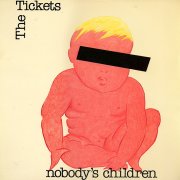 |
Nobody's Children (1981, 34.20) ***/½ |
|
| Can't Keep it in 1981 Nobody's Children Which Day is Today? Turn it Up! Crazy Lover Whatcha Gonna Do? Ray |
No Way Out Love in My Life |
|
Current availability:
Mellotron used:
Switzerland's The Tickets' second and last release, 1981's Nobody's Children, is a decent pop/rock album, in a new wave vein, probably at its best on propulsive opener Can't Keep It In, the Police-aping Crazy Lover and closer Love In My life. Decent enough, but with more than a whiff of the 'local's band' phenomenon, copying a popular overseas style for a domestic market.
Supposed Mellotron on the title track from producer Kevin Flynn, but I'll be buggered if I can work out where. The vaguest of vague strings on the fadeout? I'll give it a half T, but that's more faith than charity, or something.
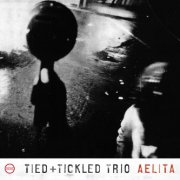 |
Aelita (1994, 43.58) ***/TAelita, Pt. 1You Said Tomorrow Yesterday Tamaghis Aelita, Pt. 2 A Rocket Debris Cloud Drifts Chlebnikov Other Voices Other Rooms Aelita, Pt. 3 |
Current availability:
Mellotron used:
Tied + Tickled Trio are a German electronica outfit, for want of a better word, who apparently share members with other bands on the same label, including The Notwist and Lali Puna. Most of their seventh album, 2007's Aelita, consists of gently ebbing and flowing samples with generous helpings of tuned percussion, although Tamaghis adds a dub element to the proceedings, while Other Voices Other Rooms throws in a rather unwelcome indie influence.
An unknown player, probably Johannes Enders, Micha Acher or Markus Acher plays Mellotron choirs and cellos on Chlebnikov. I was inclined to dismiss them as samples initially, until I realised that not only did no note reach its eight-second limit (not in itself proof of authenticity, I admit), but the choirs in particular have a certain wobbliness about them that samples don't tend to have, given that most of them have been cleaned up to an 'acceptable' level to the uninitiated user. So; possibly real Mellotron on an album that may well appeal to electronica fans, although a high tolerance for glockenspiels may well come in useful while listening.
See: Lali Puna
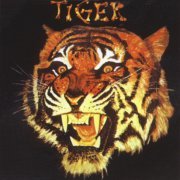 |
Tiger (1976, 42.08) ***/TTTLay MeOrdinary Girl Lay Back Stay Back Prayer I'm Not Crying Long Time Suzy Slicker Tyger, Tyger |
Current availability:
Mellotron used:
Tiger were an odd sort of band, being basically a vehicle for über-session guitarist 'Big' Jim Sullivan to, er, 'do his own thing', the end result being only partially successful. Sullivan had already released a dodgy country-flavoured album in '74, Big Jim's Back (**) and the same label, Retreat, opted to release Tiger. To be brutally honest, it's largely undistinguished mid-'70s hard rock, with the occasional country influence creeping through (obviously where Sullivan's heart really lay), with a clever pedal steel imitation from a synth on Lay Back Stay Back. Overall, though, it's not really anything to write home about, although it has its moments.
The main one of these is the sort-of ballad, Prayer, which is absolutely smothered in Dave McCrae's Mellotron choirs and strings, being easily the album's standout track, avoiding the dodgy hard rock trap into which the rest of it falls. More Mellotron on Long Time, while Suzy Slicker has a great strings pitchbend part. Tyger, Tyger opens with solo Mellotron string chords; pity about the distortion that plagues the CD reissue - I doubt if the original sounds like that. Worth buying? Moot point, really; the first album on this twofer is awful, while the only thing that makes Tiger even remotely worth the effort is the Mellotron. There was a second Tiger album, Goin' Down Fighting (***), which certainly has its moments, but being Mellotron-free I'll leave it for someone else to write about. I believe a third, Test of Time, crept out in '83, some years after being recorded, about which I know nothing.
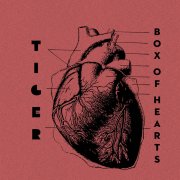 |
download (2020) ***½/½ Box of Hearts |
Current availability:
Mellotron used:
Tiger Olsson is Mellotron legend Mattias 'Änglagård' Olsson's eldest offspring, the download-only Box Of Hearts being her first English-language release. Although written by her, this has her dad's Nordic influence all over it, a quietly beautiful, yet heartbreakingly mournful love song, far more mature than you'd expect from a young woman of her age. Scandi-pop, mournful ballad division.
Hampus Nordgren-Hemlin plays Mellotron, with occasional strings, deep in the mix, alongside David Keller's cello. Given that you can listen to this for free on Bandcamp, make the effort. I look forward to an album.
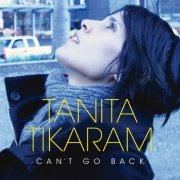 |
Can't Go Back (2012, 38.50) **½/TT½ |
|
| All Things to You Dust on My Shoes Make the Day Rock'n'Roll Science Keep it Real Can't Go Back Heavy Pressure |
One Kiss If the World Should Want for Love |
|
Current availability:
Mellotron/Chamberlin used:
I remember all the fuss amongst the chattering classes when Tanita Tikaram's first album appeared in 1988; she was absolutely flavour of the month for, er, about a month, I think. Her eighth album, 2012's Can't Go Back, doesn't sound all that different to her early work, to my ears (in fairness, I'm working from memory here): rather bland adult singer-songwriter pop, typified by material like Make The Day, Keep It Real and the title track, although, in actuality, there are almost as many upbeat numbers as ballads.
Paul Bryan plays Mellotron (his brand-new M4000) and Chamberlin, with strings (Chamby?) and cellos (Mellotron?) on Make The Day, more cellos on Rock'n'Roll and strings on Keep It Real, the title track and closer If The World Should Want For Love (and are those faint choirs on Can't Go Back?). Despite this being one of the earliest recordings of a new M4000 machine, I can't honestly recommend this to anyone but Tikaram's existing fans. Very adult, very mature, very... dull, actually. This reminds me why I never liked her first time round; terribly sophisticated, but far too near the middle of the road for my tastes.
See: Paul Bryan
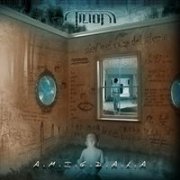 |
A.M.I.G.D.A.L.A. (2008, 54.29) ****/TTTT½ |
|
| 680819DP Symphony for a Shadow The Mirrors Room The Echo of the Dark Side Nocturnal - Part I Promenade Avec la Nuit Alter Action Eclipse |
Nocturnal - Part II A.M.I.G.D.A.L.A. |
|
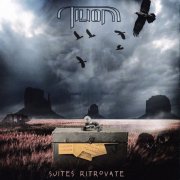 |
Suites Ritrovate (2019, recorded 2004-06 55.53) ****/TT |
|
| Cheyenne I - Incontri (Se Sai Suonare Suona, Se Sai Sparare Spara) II - Donna III - Fuga Dal Treno per Due IV - Baratto per la Felicità V - Un Addio al Mondo Nuovo Il Brutto (The Ugly) Atto 1 I - Tuco II - Riconosci Questa Faccia? III - Primo Inganno |
Atto 2 IV - Tuco (Variazione) V - Deserto e Sole VI - La Ricca Carrozza della Morte Atto 3 VII - Tuco (Variazione per Organo e Gruppo) VIII - Fratello IX - Guerra X - Ultimo Inganno Nel Volo |
|
Current availability:
 |
Mellotrons used:
You'll only hear Mellotron samples on Tilion's debut, 2003's Insolitariamente. It's a good album, but if only it were half as good as their belated follow-up, 2008's A.M.I.G.D.A.L.A., we'd be laughing. After trawling through a couple of colossal Colossus themed sets, this is an absolute joy to listen to; not overlong, inventive, melodic-yet-angular progressive rock with nary a sight of any horrible modern 'boards. The album skips through a variety of styles, while remaining cohesive, covering near-progressive metal (Symphony For A Shadow), Italian symphonic (The Echo Of The Dark Side) and sparse, piano-led progressive (Nocturnal - Part I), amongst others, only slightly let down by the part-time female vocals, which somehow don't sit that comfortably with the music. Alfio Costa gets his M400 in on every track, wondrously, pretty much all strings and flutes, although I'm sure I heard string section tapes somewhere. Most of his playing's relatively 'standard', although The Echo Of The Dark Side has a flute part (mostly mono-, occasionally poly-) running right through it, almost fooling the ear into thinking it's real in places. As you can see, the band have also contributed to several tribute/multi-artist concept albums, with worthwhile Mellotron use on most.
Although the band split in 2010, one last Tilion album has made it out into the wider world, 2019's Suites Ritrovate (Suites Rediscovered), a compilation of the two side-long pieces they recorded for Colossus' Spaghetti Epic albums, plus a 'bonus' track, Nel Volo, stuck on the end, source unknown. Both epics reaffirm just how good the band were, moving through multiple sections of rip-roaring prog, somewhere in between 'classic' and 'modern', without ever crossing the invisible line into 'tasteless'. Cheyenne probably has the edge, as Il Brutto (The Ugly)'s near-half hour length slightly overstretches the band's talents; A.M.I.G.D.A.L.A. shows that they worked better in a shorter song format. Not that much Mellotron, to be honest, with samples on Cheyenne, snippets of strings and choir on Il Brutto and a little strings on Nel Volo. Still, given that we're probably not going to see another album from the band, at least their original compositions from V/A releases are now easily available.
See: Samples etc. | Alfio Costa | Daal | Prowlers | Samurai of Prog | Colossus Project
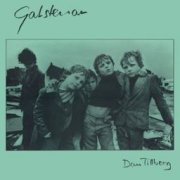 |
Gatstenar (1979, 39.42) **½/½ |
|
| Hur Var det Med Din Morsa, Tjejen (Kom Hon i Skymundan) Kom in Och Hälsa på Var du Än är Lycklig Din Första Kollision Det Blir Inte Alltid Som Man Vill Mammas Jakt på Kickar Den Som Gapar Efter Mycket |
Så Bra Ihop Slutlekt Andra Budet Det är Jag Som är Mick |
|
Current availability:
Mellotron used:
Dan Tillberg was half of Swedish prog duo Änglabarn (one eponymous album, 1973), but don't make the mistake of thinking that his solo debut, '79's Gatstenar, might be remotely progressive. It's actually an album of (mostly) Swedish-language Stones covers, better efforts including Den Som Gapar Efter Mycket (Let's Spend The Night Together) and closer Det Är Jag Som Är Mick (Jumpin' Jack Flash), injecting some much-needed energy into the proceedings. Sadly, the majority of its contents are neither here nor there, while his tuneless yelling on Din Första Kollision (19th Nervous Breakdown) and overlong, white reggae take on Det Blir Inte Alltid Som Man Vill (You Can't Always Get What You Want) are definite lowpoints.
Jörgen Bornemark plays Mellotron on Mammas Jakt På Kickar (Mother's Little Helper), with a few seconds of background strings. Mellotron fail. Actually, pretty much album fail, too. Seems he pulled the same stunt, tackling Dylan this time, on 1982's Kärlek Minus Noll. Write some songs, dude.
See: Rolling Stones
 |
Singing Ax (2010, 44.50) ***½/TT |
|
| Three Sisters Diamondback A Love No Less Worthy One Task Our Beloved Tyrant Tillman's Rag Mere Ornaments Singing Ax |
Madness on the Mountain Maria A Seat at the Table |
|
Current availability:
Mellotron used:
Josh Tillman was apparently so weary of his career as J. Tillman that he didn't even bother promoting his last album under that moniker, 2010's Singing Ax. Shame, as it's a really rather good careworn, world-weary record, full of songs of the quality of opener Three Sisters, One Task and the title track, although nothing here would improve the album by its omission.
Someone (Tillman himself? Producer Steve Albini?) plays especially mournful uncredited Mellotron, with strings on Three Sisters, flutes on Our Beloved Tyrant and A Seat At The Table and cellos on Madness On The Mountain, all imbued with those impossible-to-fake wobblies from a real machine. After dumping J. Tillman, he subsequently became Father John Misty, seeming much happier in that persona.
Official Father John Misty site
See: Samples etc. | Father John Misty
 |
Hot Dreams (2014, 43.04) ***/TTT |
|
| Beat the Drum Slowly Hot Dreams Curtains!? Bring Me Simple Men Resurrection Drive, part II Grand Canyon This Low Commotion The New Tomorrow |
Run From Me The Three Sisters |
|
Current availability:
Mellotron/Chamberlin used:
Canada's slightly irritatingly-named Timber Timbre play a kind of atmospheric indie folk, which, on their fifth full-lengther, 2014's Hot Dreams, works better in some places than others. Highlights include the mournful This Low Commotion, built around a superb descending line and ghostly closer The Three Sisters, although the pre-psych feel of opener Beat The Drum Slowly, Hot Dreams and Bring Me Simple Men clearly weren't written with those of a psychedelic worldview in mind.
The band used Canada's National Music Centre's plexiglass M400 and an unidentified Chamberlin M1, with a Mellotron flute line and vibes on Beat The Drum Slowly, Chamby strings on Hot Dreams, both from Mathieu Charbonneau, Mellotron cellos from Simon Trottier on Resurrection Drive, Part II, Charbonneau on background Chamby strings on Grand Canyon, Taylor Kirk on Mellotron cellos and wobbly flutes on This Low Commotion and Charbonneau once more on Mellotron cellos and flutes on closer The Three Sisters. Confusingly, Mika Posen's 'strings' (she's a violinist), credited on several tracks, sound an awful lot like a badly-adjusted Mellotron, but clearly aren't, while the band also use a contender for the title of 'world's first synth', a Hammond Novachord, to confuse the issue yet further. Worth hearing? In places, its tape-replay work being one of its best features.
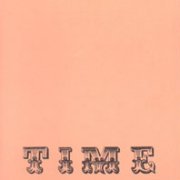 |
Time (1972, 33.08) ****/½Istina MasinaPjesma #3 Hegedupa Upa Kralj Alkohol Za Koji Zivot Treba da se Rodim |
Current availability:
Mellotron used:
Time can lay claim to being Yugoslavia's first progressive band, releasing their eponymous debut in 1972. It's influenced as much by late-period psych and proto-jam bands as Western European prog, with Vedran Bozic's incendiary guitar work on Za Koji Zivot Treba Da Se Rodim letting you know you don't have to speak a Romance or Germanic language to rip up the fretboard, thank you very much. There isn't a bad track to be heard here, although the aforementioned lengthy Za Koji Zivot Treba Da Se Rodim is a highlight, moving through several different feels, sounding not unlike Uriah Heep in places, if you can imagine David Byron replaced by a man with a large moustache and an endless appetite for slivovitz. Er, hang on a moment...
I was quite sure there was no Mellotron on this record, until its final track, which I refuse to name again, which features a brief burst of what are quite clearly Mellotron cellos, presumably from organist Tihomir Asanovic, although they're nowhere else to be heard on the Hammond-heavy album. Their follow-up, the imaginatively-titled Time II (***½), is supposed to feature the mighty Mellotron, too, but all I can hear is real strings on one track, so scratch that one. As far as Time goes, if you want to hear where Yugoslav prog was at in the mid-'70s (what d'you mean, you don't?), I couldn't recommend it more highly, though not for its minimal Mellotron use.
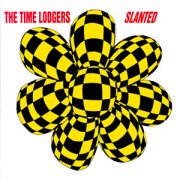 |
Slanted (1992, 24.22) **½/TOkay!Trudi Tangerine In the Supermarket Dear Nellie Goodrich Slanted? Oh Yeah!!! Hush Something I Can Keep Mary of the Convent School |
Current availability:
Mellotron used:
Norwegians The Time Lodgers played an '80s-ish brand of jangly indie a few years late, 1992's Slanted mini-album being a slight, yet largely inoffensive effort that's rather of its time. Best tracks? Probably Slanted? Oh Yeah!!!, with its slight psych vibe and Hush. Oddly enough, the album improves as it progresses, opening with its most irritating tracks. Maybe they were considered the most commercial.
Odd T. Benkestok plays a pleasant Mellotron flute part on Slanted? Oh Yeah!!!, alongside real strings, although it's far from enough to make this especially worth hearing. Not terrible, but not actually worth twenty-four minutes of your time, either.
 |
Woe Be Gone EP (2001, 21.19) ***½/TGin I WinLorili This Field Needs a Reaper Evil I Hear You Hear |
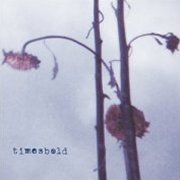 |
Timesbold (2002, 45.04) ***½/T |
|
| Gin I Win Sewn in Seems Sin(g) ee cummings House Demands Water Bearer Word Some Awful Men |
Knife Attack It's Been a Fine Time... Van Gogh George Collins |
|
 |
Eye Eye (2004, 44.53) ***½/T |
|
| Bone Song Go Down Vengeance Day Wind to Rise Call to Arms All Blues Wings on a Girl Kudzu |
Sometimes the Water Riches and Grief Black Eyed Suzy It's a Sag (When You Lift the World) (Knowwhere) |
|
Current availability:
Mellotrons used:
Timesbold are yet another entrant in the 'melancholy Americana' sweepstake, having as much in common with the more miserabilist end of, say Wilco as the relentless downbeatness of the wonderful Low. Suffice to say, there's barely a track spread across these releases where the pace picks up to anything above funereal, but since when was that a problem? After a couple of singles, Timesbold took the plunge into longer formats with an EP, Woe Be Gone, although song titles like This Field Needs A Reaper and Evil prove the lie on that one. I believe Max Avery Lichtenstein plays the Mellotron, presumably amongst other keyboards, with a very minor Mellotron flute part towards the end of Gin I Win and some background choirs on Evil.
2002 brought their first full-length album, the eponymous Timesbold and it seems to be business as usual, only more of it, with highlights including Sewn In Seems and their tribute to American poet e e cummings [sic], er, e e cummings. Only two Mellotron tracks, one of which is a repeat of Woe Be Gone's lead track, Gin I Win, although the flute part in Sewn In Seems is far more upfront. Two years on, second album Eye Eye is more of the same, although a couple of tracks pick it up a little. Yet again, two Mellotron tracks (Sometimes The Water and Riches And Grief), yet again, flutes on both, opening the former under the vocals, while the latter has a brief part later in the song, plus an equally brief string part, for the first time.
As with many Americana albums, I suspect Timesbold's work will need several plays to reveal their charms fully and I'm afraid I simply don't have enough time to really do them justice at the moment. I can, however, recommend them to anyone who likes the style, although they're a bit thin on the ground Mellotronically. Recommended anyway.
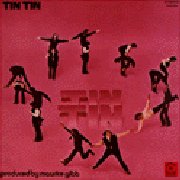 |
Tin Tin (1970, 35.11) ***½/TT |
|
| She Said Ride Swans on the Canal Flag/Put Your Money on My Dog Nobody Moves Me Like You Tuesday's Dreamer Only Ladies Play Croquet Family Tree Spanish Shepherd |
He Wants to Be a Star Toast and Marmalade for Tea Come on Over Again Manhattan Woman Lady in Blue |
|
Current availability:
Mellotron used:
Tin Tin were an Aussie four-piece who formed in 1968 and had a strong Bee Gees connection, via the Gibb brothers' early success in their adopted country; Steve Kipner's father, Nat, produced their early work and members of Steve's band played on their records (thanks for that, Joe). Maurice Gibb's patronage did Tin Tin no harm at all, of course and he's credited as a band member on at least one issue of this album. Tin Tin is slightly harder-edged than you'd expect, all things considered, although they were never exactly going to rival Black Sabbath in the heaviosity stakes. 'Baroque pop' is possibly the best description I can think of, with tracks like Swans On The Canal and the instrumental Spanish Shepherd conjuring up images of lace cuffs and the like. Or maybe that's just me.
A CD version of the album gives partial credits, telling us that Maurice plays Mellotron flutes on the harpsichord-driven Only Ladies Play Croquet and various parts on Spanish Shepherd, He Wants To Be A Star, Toast And Marmalade For Tea (with Steve Groves) and Manhattan Woman, presumably leaving Kipner to play the occasional string chords on Flag/Put Your Money On My Dog, brass on Nobody Moves Me Like You, the brass/strings mix on Family Tree and flutes on Come On Over Again, although he may, of course, also have added parts to the other highlighted songs. There's genuine orchestral accompaniment on a few tracks, too, notably Swans On The Canal and with several more 'credited but inaudible' tracks, it's hard to know what's going on, really.
So; something of a period piece, but not at all bad and more listenable than most of the Bee Gees' work from the time. Again, reasonable Mellotron work, though not a classic. Worth hearing for fans of the era. There was a second Tin Tin album the following year, Astral Taxi, but I believe it's Mellotron-free. Incidentally, Toast And Marmalade For Tea was apparently a major hit for the band worldwide and Steve Kipner went on to be a successful songwriter, still working today.
See: Bee Gees
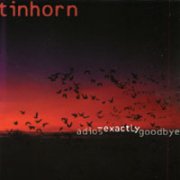 |
Adios-Exactly-Goodbye (1999, 50.12) **½/T |
|
| Radio Shoe Shine Most of All Take the Line Everything Riverbed Past Familiar MPX1 50's Sci-Fi End of a Holiday |
Drive Insomnia She Closed Her Eyes |
|
Current availability:
Mellotron used:
St. Louis' Tinhorn's debut, 1999's Adios-Exactly-Goodbye, is a fairly typical American indie album of its era, apparently loosely comparable to the work of Yo La Tengo, better tracks including Riverbed and Drive, although that isn't really saying very much, sadly.
Sean Garcia and Charles Shipman both get Mellotron credits, with background strings and flutes on Most Of All, identifiably real at the end of the track and a flute line on closer She Closed Her Eyes. Despite vaguely rumoured Mellotronic involvement, 2002's Stereowide features absolutely zilch on the tape-replay front, so I can't even be bothered to review it.
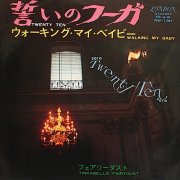 |
7" (1968) ***½/½ Twenty Ten Walking My Baby |
Current availability:
Mellotron used:
Tinkerbell's (or Tinkerbells) Fairydust, from East London, were originally known as The Rush, 'going psychedelic' with 1967's Lazy Day. Their second single is the one track by the band that concerns us here, though: Twenty Ten is a classic, minor-key psych effort, bearing comparison with contemporaneous material by The Status Quo (as they were then), amongst others. This should've been a hit, especially with the support it received from John Peel, but it wasn't to be.
Someone, probably guitarist Stuart Attride, added low Mellotron strings to the track, with possible other parts in the mix. It became the lead-off track of their eponymous unreleased 1969 album, which finally saw the light of day nearly thirty years later and has just had an expanded reissue on Grapefruit. The rest of the album's a bit hit and miss, but contains enough decent tracks to make it worth the effort for fans of the era.
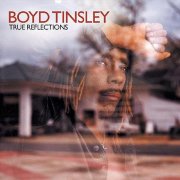 |
True Reflections (2003, 47.29) **½/½ |
|
| It's Alright Show Me So Glad Listen Cause it's Time Long Time to Wait Perfect World Cinnamon Girl |
Run What a Time for Love True Reflections |
|
Current availability:
Chamberlin used:
After hearing Boyd Tinsley's True Reflections, it shouldn't come as much of a surprise to discover that his 'day job' is violinist with the deeply unexciting Dave Matthews Band, as its bland, mainstream sound is well in keeping with that band's modus operandi. It's an impeccably produced and played record, don't get me wrong, but its 'upbeat with a hint of melancholy' approach is somewhat well-worn by now and, to my ears, Tinsley isn't adding anything to the genre and don't let the raucous guitar solo in Long Time To Wait fool you into thinking he knows how to rock after all. He even manages to bugger up Neil Young's incomparable Cinnamon Girl, sounding more West Coast than CSN&Y ever could, although it's still the best song here, by sheer dint of being written by Neil Young.
The highly ubiquitous Patrick Warren is credited with Chamberlin and indeed, there it is on Show Me, with a passable string part, although we could've done with hearing more of it. Overall, then, a very mainstream record that you'll either like or, er, won't. I didn't. One decent Chamby track, but nothing you haven't heard many times before, done better.
See: Dave Matthews Band
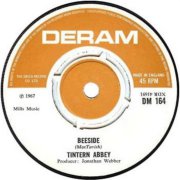 |
7" (1967) ***½/TT Beeside Vacuum Cleaner |
Current availability:
Mellotron used:
Tintern Abbey are one of those legendary 'one killer single then disappeared' British psych outfits, although a second single was at least demoed. Beeside (actually the A-side) is a wonderfully creepy little number that almost grinds to a halt in the middle before dragging itself back to its previous lethargic pace. The flip, Vacuum Cleaner, is a decent song, though a little more upbeat; strange it wasn't the A-side, really...
MkII Mellotron strings on Beeside from the usual 'player unknown', adding nicely to its gothic atmosphere. This is fairly easy to find, notably on The Rubble Collection, Vol. 6, although I believe it's been anthologised all over the place. There is a vague Tintern Abbey/Elmer Gantry's Velvet Opera connection, as later guitarist Paul Brett went on to join them, before starting his long-running solo career.
See: Elmer Gantry's Velvet Opera
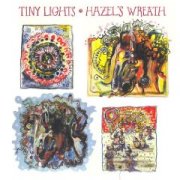 |
Hazel's Wreath (1988, 33.55) ***½/TAround it Goes AroundGreen Instead The Bridge Wickerman's Dog Colors and the Light Grown-Up Fish The Capricious Yearnings of King Edward Before You Go Red Planet |
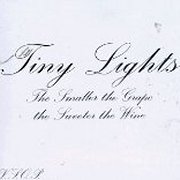 |
The Smaller the Grape the Sweeter the Wine (1997, 41.57) ***/T |
|
| I Had it All Pinprick Maybe You Will Listen Sing to Me Who's That Whispering Blue Sky Tracey, Tracey Lazybones |
No Baby, No Songs Would You Like to Float |
|
Current availability:
Mellotrons used:
Tiny Lights were a sort of, er, folk/rock/classical/jazz/whatever outfit, who (thankfully) didn't fit into the '80s in the slightest. Hazel's Wreath is a pretty eccentric record and not for those who love stylistic consistency above all else, but there are several excellent songs on the album, particularly the bulk of side two, which is largely the folkier end of their repertoire. With both a violinist and a cellist, the folk and classical influences cut through all over, but they could rock, too, when the mood took them. Mellotron from guest Jack Pettruzzelli on Red Planet, with some fairly full-on choir chords, which is more than you'll hear on almost any other album from that benighted decade. Anyway, a good, if eclectic album, but with only one Mellotron track it's not an essential on that front.
Almost a decade later, Tiny Lights used a Mellotron again, on 1997's The Smaller the Grape the Sweeter the Wine. Unless it was all a huge wind-up, the album sounds, to my ears at least, a great deal more commercial than their early work, at least until what would be side two were this on vinyl. From Blue Sky onwards, the album gets rather more interesting, although not up to the Hazel's Wreath level, to be honest. Andy Burton plays some excellent pitchbent Mellotron strings on album closer Would You Like To Float, but it's not really enough to make it a Mellotron album.
So; one very and one mildly interesting album and not very much Mellotron. If you want to hear Tiny Lights, go for the former here rather than the latter, I think.
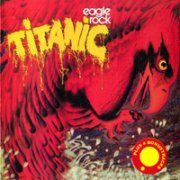 |
Eagle Rock (1973, 44.36) ***½/T½ |
|
| Macumba One Night in Eagle Rock All Around You One of Your Kind Heia Valenga Dying Sun And it's Music Richmond Express |
Maureen The Skeleton |
|
Current availability:
Mellotron used:
Titanic were the first Norwegian band to gain international acceptance, hitting the charts continent-wide with Sultana in 1971; it even reached no. 5 in the UK, but they were fronted by British singer Roy Robinson, which can't have hurt their overseas profile. I haven't heard their first two albums and the later ones suck, but Eagle Rock is pretty good, in a sub-Uriah Heep kind of way. There's a slight African tribal percussion theme running through the album, reminding me of, er, Uriah Heep on Look at Yourself, but overall, this is just an ordinary mid-'70s hard rock album. It does have a couple of highlights, though, in the epic One Night In Eagle Rock and the excellent Dying Sun, where the band stumble across a great riff, then brutally club it to death over the course of several minutes.
Keyboard man Helge Groslie sticks mainly to Hammond and Rhodes, but the odd bit of Mellotron creeps in here and there, though I rather suspect they didn't own one, or use it anywhere else. One Night In Eagle Rock has a repeating flute motif, while both One Of Your Kind and Maureen feature a few seconds of strings, but that's it. So; not bad, but not that good either, really. One for aficionados of the era, I think.
 |
Wounds Wide Open (2006, 41.01) ***/½ |
|
| Intro - Sorrow Wicked Circle Guilt Ridden State Like Never Before Under a Velvet Sky Scar Diary New Heaven The Quiet Room |
Liquid Lies I Just Want You Sorrow Remains |
|
Current availability:
Mellotron used:
To/Die/For (shit name, guys) began life in the early '90s as Mary-Ann (no better), 2006's Wounds Wide Open being their fifth full-lengther. Generally described as 'gothic metal', their sound combines downtuned, none-more-heavy guitars with keyboards and actual vocal melodies, making for a perfectly listenable end result, if not one that's going to appeal to everyone.
Esa Kotilainen is credited with Mellotron, but, amongst a raft of Jape Perätalo's OTT keys, it's pretty hard to tell where. The male voices on Wicked Circle, Guilt Ridden State and closer Sorrow Remains? It's the best I can do, I'm afraid. I suppose this is good at what it does, all assuming you like etc. etc., but don't bother for the Mellotron.
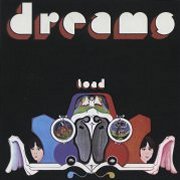 |
Dreams (1975, 37.45) **/½Keep on Movin'Dreams Let's Get Hi Electric Rider Because You're Not You Know Who I am Boogin' on a Saturday Night Break Down |
Current availability:
Mellotron used:
I'm told Toad's first two albums (Toad and Tomorrow Blue) are undeservedly obscure stonkin' hard rock classics, which I'll have to take at face value, as their third and last effort, Dreams, is a dull, third-rate effort with no obvious distinguishing features whatsoever. Track titles such as Let's Get Hi and (appallingly) Boogin' On A Saturday Night say all that needs to be said, really, although the album has the odd reflective moment (chiefly the title track) to alleviate the tedium.
Although there's no keyboard player credited, there's a little Rhodes to be heard here and there, plus some faint Mellotron strings on Dreams and You Know Who I Am, but we're really not talking anything that worthwhile, to be honest; overall, a bit of a dead loss. While I can't comment on their earlier releases, it seems to me you'd be better off sticking with them. Incidentally, my research for this review tells me that the mysterious Vic Vergat, whose late-'70s solo album used to do the rounds, was actually Toad's guitarist, his real name's Vittorio Vergeat and he was the only Italian in the band. The other two members were drummer Cosimo Lampis and bassist Werner Fröhlich, for what it's worth.